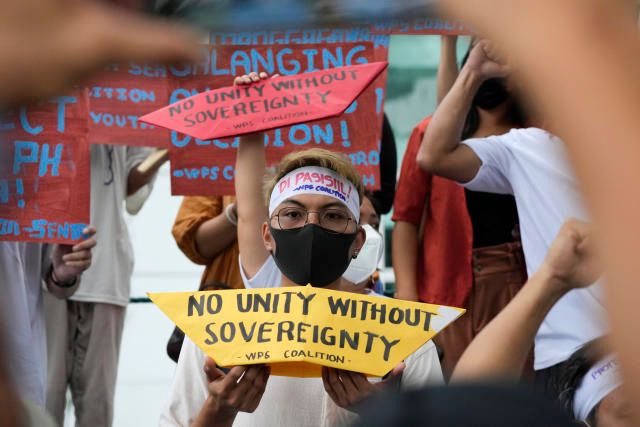U.S. Secretary of State Antony Blinken issued a renewed call to China to comply with a 2016 arbitration ruling that invalidated Beijing’s vast claims in the South China Sea. Blinken also issued a warning that the United States is obligated to defend treaty ally Philippines if its forces, vessels, or aircraft come under attack in the disputed waters. China’s claims in the South China Sea were found to be invalid in the 2016 ruling.
Blinken’s statement, which was issued by the U.S. Embassy in Manila on Tuesday, was released on the sixth anniversary of the decision made in 2016 by an arbitration tribunal set up in The Hague under the United Nations Convention on the Law of the Sea. The tribunal was established in The Hague after the Philippine government filed a complaint in 2013 against China’s increasingly aggressive actions in the disputed sea. Blinken’s statement was released on the sixth anniversary of that decision.
China did not take part in the arbitration, dismissed the verdict as a farce, and continues to disobey it, which has led to it getting into territorial disputes with the Philippines and other Southeast Asian claimant nations during the last several years.
Blinken added, using an abbreviation for China’s official name, “We call once again on the PRC to adhere by its commitments under international law and discontinue its aggressive behaviour.”
According to Blinken, “We also reaffirm that an armed assault on Philippine military services, public vessels, or aircraft in the South China Sea would invoke U.S. mutual defence commitments” under the 1951 U.S.-Philippines Mutual Defense Treaty. This statement was made in reference to the fact that the United States would be obligated to provide mutual defence in the event of such an attack.
It is considered to be rich in underwater gas and oil resources and is a location where an estimated US$5 trillion worth of commerce and products are moved through each year.
The conflict zone has evolved into an important battleground in the competition between the United States and China.
Washington does not lay a claim to the waters that are in dispute; however, it has sent its naval vessels and air force jets to patrol the waterway for decades and maintains that it is in the national interest of the United States to allow free navigation and overflight in the area that is in dispute. This has resulted in heated responses from China, which has accused the United States of interfering in a conflict that is solely between Asian countries and urged it to back off.
On Tuesday, Philippine Foreign Secretary Enrique Manalo stated that the arbitration ruling would be a pillar of the new administration’s policy and actions in the disputed region. He rejected attempts to undermine the “indisputable” decision and stated that the ruling would be a pillar of the new administration’s policy and actions in the disputed region.
“It is no longer possible to deny or refute these facts; they have reached the point where they are decisive as well as incontrovertible. “There will be no more consideration,” stated Manalo in a statement.
“We categorically oppose any efforts to undermine it… even wipe it from law, history, and our collective memories,” added Manalo, who did not mention China but definitely referred to it. “even erase it from our collective memories.”
The policy position that was announced by Manalo for the administration of President Ferdinand Marcos Jr., who took office on June 30 following a resounding election victory, is expected to be met with disapproval by China.
Rodrigo Duterte, the predecessor of Marcos Jr., put the arbitration ruling on the backburner for years after he took office in 2016, and he nurtured cosy ties with Chinese President Xi Jinping while frequently criticising U.S. security policies. Marcos Jr. has put the arbitration ruling at the forefront of his administration’s priorities.
Marcos Jr. has validated the arbitration decision and said that he would not let even one “square millimetre” of Philippine seas to be encroached upon in any way, shape, or form.
But in an interview he gave to the DZRH radio network in January, before he was elected president, Marcos Jr. claimed that since China has refused to accept the verdict, it won’t help resolve conflicts with Beijing, and “therefore that alternative is not accessible to us.” Marcos Jr.
When asked about it at the time, Marcos Jr. described Duterte’s strategy of diplomatic engagement with China as “truly our only choice.”
On Tuesday, he was confronted with demands that he persuade China to comply with the arbitration verdict and reverse Duterte’s lenient policy, both of which have endangered Philippine sovereignty in the contested sea.
On Tuesday, dozens of left-leaning activists and workers staged a demonstration in front of the Chinese Consulate in Makati, which is located in the financial district of Manila. They demanded that Beijing respect the arbitration ruling and that Marcos Jr. defend the country’s territory and sovereign rights in the South China Sea.
